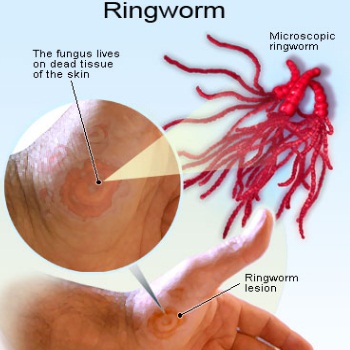What is Ringworm?
Ringworm, also known as dermatophytosis or tinea, is a fungal infection of the skin. The name “ringworm” is a misnomer, since the infection is caused by a fungus, not a worm.
Ringworm infection can affect both humans and animals. The infection initially presents with red patches on affected areas of the skin and later spreads to other parts of the body. The infection may affect the skin of the scalp, feet, groin, beard, or other areas.
Recognizing Ringworm
Symptoms vary depending on where you’re infected. With a skin infection, you may experience the following:
- red, itchy, scaly, or raised patches
- patches that develop blisters or begin to ooze
- patches that may be redder on the outside edges or resemble a ring
- patches with edges that are defined and raised
If you’re experiencing dermatophytosis in your nails, they may become thicker or discolored, or they may begin to crack. If the scalp is affected, the hair around it may break or fall off, and bald patches may develop.

Types of Ringworm
Ringworm can go by different names depending on the part of the body affected.
- Ringworm of the scalp (tinea capitis) often starts as small sores that develop into itchy, scaly bald patches. It is most common among children.
- Ringworm of the body (tinea corporis) often appears as patches with the characteristic round “ring” shape.
- Jock itch (tinea cruris) refers to ringworm infection of the skin around the groin, inner thighs, and buttocks. It is most common in men and adolescent boys.
- Athlete’s foot (tinea pedis) is the common name for ringworm infection of the foot. It is frequently seen in people who go barefoot in public places where the infection can spread, such as locker rooms, showers, and swimming pools.
How long does Ringworm last?
Skin medications may clear ringworm in two to four weeks. If you’re experiencing severe dermatophytosis that isn’t responding to over-the-counter treatments or treatment at home, your doctor may prescribe antifungal pills to clear up the infection. Most people respond positively to treatment.
Preventing ringworm
You can prevent ringworm by practicing healthy and hygienic behaviors. Many infections come from contact with animals and lack of proper hygiene. Tips to avoid ringworm include:
